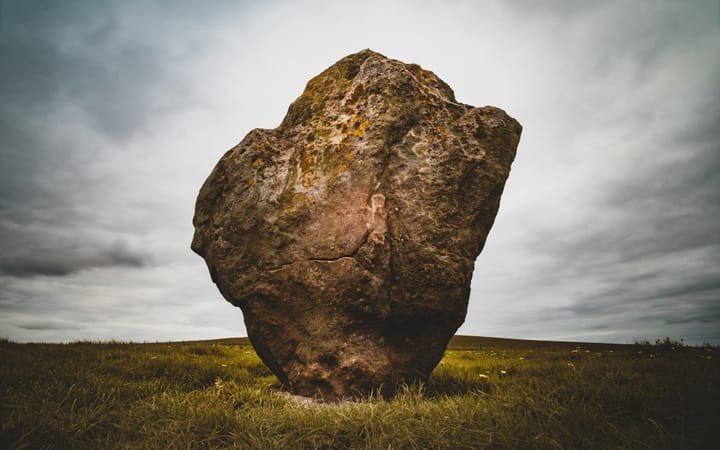How Do I Be Strong When I Feel So Weak?
What is the Book of Joshua all about?...This book is a continuation of all God has said and done in the first five books of the Bible.

Joshua 1-5
Today's Scripture Passage
A Few Thoughts to Consider
What is the Book of Joshua all about?
“The name ‘Joshua’ is composed of two parts. The first part is a shortened form of the divine name ‘LORD.’ The second part is the Hebrew word for ‘salvation.’ Thus, the name means ‘the Lord is salvation.’”[1] This book is a continuation of all God has said and done in the first five books of the Bible. As Richard Hess writes,
Each part of Joshua emphasizes the gracious and redemptive work of God on behalf of Israel and of Joshua. From Chapter 1, God is in command of both. In chapter 2, Rahab’s confession of God’s salvation (vv. 9–11) provides the background for the whole story. This demonstrates the mercy of God in delivering Rahab. It also proves the justice of God in defeating and destroying all those who continued to resist God’s plan for his people.[2]
In Joshua 1:6-7, we see this statement: “Be strong and courageous, for you will distribute the land I swore to their ancestors to give them as an inheritance. 7 Above all, be strong and very courageous to observe carefully the whole instruction my servant Moses commanded you. Do not turn from it to the right or the left, so that you will have success wherever you go.”
Now that Moses is dead, God shows Joshua he will be with him. Verse 14 says, “On that day the Lord exalted Joshua in the sight of all Israel, and they revered him throughout his life, as they had revered Moses.” Then, in Joshua 4:20-24, after the Israelites miraculously cross the Jordan River (like the Red Sea) and stand on the edge of Jericho, we see Joshua’s response:
20 Then Joshua set up in Gilgal the twelve stones they had taken from the Jordan, 21 and he said to the Israelites, “In the future, when your children ask their fathers, ‘What is the meaning of these stones?’ 22 you should tell your children, ‘Israel crossed the Jordan on dry ground.’ 23 For the Lord your God dried up the water of the Jordan before you until you had crossed over, just as the Lord your God did to the Red Sea, which he dried up before us until we had crossed over. 24 This is so that all the peoples of the earth may know that the Lord’s hand is strong, and so that you may always fear the Lord your God.”
Notice the phrase “all the peoples of the earth.” This tells us that despite how we might be tempted to think Israel’s conquest of the land is exclusively for their benefit, this was not what God envisioned. God would work through Israel to bring justice and bless all nations. When those such as Rahab did what was right, they would receive grace.
This point is reemphasized in Joshua 5:13-15 when Joshua meets an angelic being with a sword. Joshua immediately asked if this man was for or against Israel, and the man responded, “Neither.” The real question for Joshua wasn’t if God was on his side. It was whether Israel was on God’s side. The same holds true for us today.
A Meditation to PRAY
Praise | I praise you for your mighty acts. You have shown your people that we can trust you in every situation and that anything is possible with you.
Release | I release my doubts and forgetfulness of all the times you have helped me with my own battles. I let go of the hesitations that hold me back from stepping into the fullness of what you have promised.
Ask | I ask that you renew my memory of all the great deeds you've done in my life, just as you parted waters and made a way for the Israelites. Remind me to share my testimony of your goodness so that others may know you are the living God.
Yield | I yield to your will, knowing you are the same God who works wonders today. I want to trust as Joshua did, to follow your lead, and to honor you by remembering your faithfulness in my life.
A Challenge to Act Like Christ
Only as we read the Book of Joshua through the lens of Jesus does it take on added meaning for us today.
God’s promise to Joshua in Chapter 1 is echoed in Matthew 28:18-20 when,
18 “Jesus came near and said to them, ‘All authority has been given to me in heaven and on earth. 19 Go, therefore, and make disciples of all nations, baptizing them in the name of the Father and of the Son and of the Holy Spirit, 20 teaching them to observe everything I have commanded you. And remember, I am with you always, to the end of the age.’”
Notice the parallels. As Moses died, Jesus left his disciples when he ascended into heaven. But just as God was with Joshua, we have the Holy Spirit who lives inside us. This is where we find our confidence. As Richard Hess notes, “For the Christian, Christ’s promise of his presence to his disciples resembles God’s promise to Joshua. It forms the basis for sending his disciples on their worldwide mission.”[3] This mission isn’t to take over a physical land. Instead, it’s to share the love of Jesus with those who do not know him.
Sometimes, this mission feels daunting, and like we’re always falling short. We don’t share Jesus with others as we feel we should or do not see the fruit we’d like. We feel weak and wonder if God is with us. It’s here we should take note of our own memorial stones and those times God has worked through us in the past. And as we do, we should take heart and remember that the Holy Spirit is at work within us. Because of him, we can be strong and courageous and remember that the Lord is our Salvation.
Just as he was with Joshua, so he will be with us.
*Unless you specify otherwise, comments and questions you ask may be featured in upcoming podcast episodes.
[1]Richard S. Hess, Joshua: An Introduction and Commentary, vol. 6 of Tyndale Old Testament Commentaries. IVP/Accordance electronic ed. (Downers Grove: InterVarsity Press, 1996), 16.
[2]Richard S. Hess, Joshua: An Introduction and Commentary, vol. 6 of Tyndale Old Testament Commentaries. IVP/Accordance electronic ed. (Downers Grove: InterVarsity Press, 1996), 56.
[3]Richard S. Hess, Joshua: An Introduction and Commentary, vol. 6 of Tyndale Old Testament Commentaries. IVP/Accordance electronic ed. (Downers Grove: InterVarsity Press, 1996), 78.




Comments ()